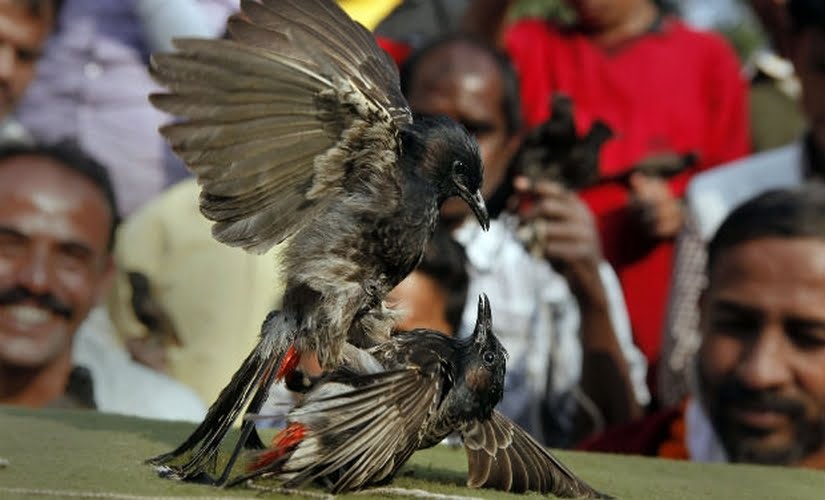Call it the ‘Tamil Arab Spring’ or call it a misguided people’s movement mobilised to validate animal cruelty using sheer brute force. But the massive movement in favour of jallikattu that’s sweeping across Tamil Nadu has reduced the fight to legalise the ancient sport into a Tamil pride vs Peta debate.
While the largely apolitical, peaceful movement was praised for setting a precedent in portraying civil dissent, many argued that it will set a dangerous precedent, of amending laws to commensurate with public sentiment.
Swarming masses of youth gathered on the streets of Chennai, Madurai and elsewhere in Tamil Nadu, which may have forced the government to buckle under, but the raging debate around the issue has opened a Pandora’s Box — will other such banned or controversial sports that are also cruel to animals be allowed to continue?
While the anti-jallikattu camp is accused of cherry-picking their fight and focussing only on Tamil culture, we decided to look at similar sports practiced across the country in the name of religion, which are opposed by animal rights activists.
Bulbul fight in Assam

Bulbul fight in Assam. News18
Assam celebrates Bhogali Bihu with much frolic and merriment in January each year. However, the festival that coincides with Makar Sankranti, Pongal and Lohri — all celebrated at the end of the harvest season — has ironically also drawn controversy for the same reason.
Hundreds of people have been engaged for generations in catching and training the nightingales or bulbuls, as the bird is commonly known in other parts of India, for bird fights in the state. The endangered species is then trained and fed in preparation of the fight for a month before the festival. Subsequently, they are egged on to fight each other till one dies.
The festival could not be held since the past two years, in view of the Supreme Court judgement banning animal cruelty. However, voices of protest to reinstate the popular sport, which the locals argue is a tradition and ironically a way to conserve local species, have grown in the wake of pro-jallikattu protests. The law of the land can’t view two cases with difference lens, they say.
Cock fights in Andhra Pradesh

Cock fight in Andhra Pradesh. Wikimedia Commons
Another animal sport associated with the harvest festival in January is cock-fighting that takes place in the rural swathes of Andhra Pradesh. These cock fights often result in the death of the warrior birds.
According to a report in The Times of India, people spend anything upwards of Rs 2 lakh per war-ready bird and make them fight in specially designated arenas. The sport commonly involves massive betting, and with such huge money at stake, bird owners leave no stones unturned in making their roosters more ferocious. From feeding the birds a special diet of kheema and eggs, to injecting them with muscle hormones, the fighter cocks are prepared to sustain bloody injuries.
To make the fights even more ferocious, villagers attach sharp blades and knives to the birds’ limbs to show blood in the fight.
Moreover, as Union Minister of Women and Child Welfare Maneka Gandhi points out in her Firstpost coloumn, lakhs of birds are confined in packed cages that are kept in dark. They are then repeatedly poked with sticks till they become vicious, and are then made to fight till one of the two birds dies. The villagers later feast on the dead bird. Just like jallikattu, cock fights have also garnered much flak from animal rights’ activists and are banned under the Prevention of Cruelty to Animals Act, 1960, and the Andhra Pradesh Gaming Act, 1974.
Kambala in Karnataka

Kambala in Karnataka. Wikimedia Commons
In parts of coastal Karnataka, bullock cart races are traditionally organised as a sport. The buffaloes or bulls are inherently slow-moving animals, comfortable bearing considerable burden but running or speed is not their forte. However, the animals are whipped and made to race through flowing water. Many beasts get injured due to the ferocious beatings while several sustain injuries as their bones break due to the force of running in flowing water.
According to The Times of India, Kambala has been stayed by the Karnataka high court on a PIL filed by People for the Ethical Treatment of Animals (Peta) India. Another report in The Indian Express states that the Animal Welfare Board of India (AWBI) has written a letter to the Karnataka government requesting it to stop the practice, citing the Supreme Court judgement on jallikattu.
Buffalo sacrifice in Uttarakhand
According to a report in DNA, mass sacrifice of buffaloes are made in Garhwal region of Uttrakhand in honour of the goddess Manju Bhog. “The animals are bathed and made to run in panic as village youth make them stumble midway. On the main day, they are made to run towards the temple and many die on the steep slopes. Those that manage to reach the top are sacrificed by the villagers,” the article states, explaining the ritual.
Bullock cart race in Maharashtra

A bullock cart race in progress at Shahpur village in Karad, Maharashtra. PTI
An event very similar to Kambala is held in rural Maharashtra, where bulls are tied together and are made to race. Maneka Gandhi condemned the sport while pointing out that the sports is vicious and brutal. “They are fed alcohol and they have iron thorns inserted into their anuses. They are steered by their tails which break in the first few minutes. They are whipped mercilessly again and again. Many die or are maimed permanently,” she says in her Firstpost article.
According to The Times of India, animal rights activists provided evidence in the Supreme Court saying immense misery and pain is caused to these animals in order to make them run, arguing that it violates the rights of animals guaranteed under the Prevention of Cruelty to Animals Act. The apex court had then banned the sport along with jallikattu, but demands of allowing it have surfaced again, now that a state-specific ordinance for Tamil Nadu was passed.
According to The Financial Express, Shiv Sena has threatened to stage Marina Beach style protests in Maharashtra after the Budget Session claiming that the sport commands same emotional importance for farmers in Maharshtra as jallikattu has in Tamil Nadu.
[Source:-Firstpost]








